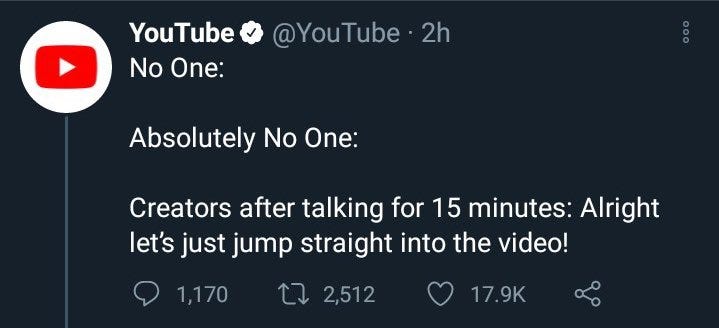Marketing BS Weekly Briefing: Influencers, Potato Chips, Braces, Incentives and Nuclear Fusion
What Third Way CMOs need to know this week
Apologizes for the issues with the essay yesterday. Free subscribers did not receive it until the afternoon (as I was finishing up work on this briefing and caught the error). Fixing the error required that I sent it out a second time to paid subscribers. Sorry. We will do better in future.
Speaking os which: Marketing BS will go premium on October 19th (just in time for my birthday). Subscribers will continue to receive the weekly essay, the weekly briefing, and the two-part podcast. Free subscribers will receive Friday email with at least one piece of content from the week. If you have not already, you can subscribe here for 50% off until October 16th. Podcast this week will be with Wendy White, chief marketer at Egencia.
Follow-up
Coinbase: On September 27th Brian Armstrong, CEO Coinbase, wrote a post about how his company is going to focus on growing the company, and not on activism or taking political stances (This is the same letter I shared in last week’s briefing). In the last ten days the tech world has divided on the issue. Software engineer Stefan Ruijsenaars collected tweets from over 45 CEOs/founders who expressed support for Armstrong. Meanwhile Dick Costolo (former CEO Twitter, now VC) expressed distain for the idea that companies could be apolitical and tweeted "Me-first capitalists who think you can separate society from business are going to be the first people lined up against the wall and shot in the revolution. I'll happily provide video commentary.” He has since deleted the tweet. I was going to write more in this briefing, but it got so long that I am going to share it as next week’s essay.
Programatic Advertising: Also shared last week, but worth calling out again given yesterday’s essay. P&G’s CMO is moving away from upfronts and wants more last minute - i.e., programatic - buying at “market rates”. He says, “A better name than the ‘upfronts’ might be the ‘FOMOs.’ We almost always end up buying too much, but we can buy ‘options’ to return some spending without penalty—and to avoid the open ‘scatter market’ where even higher prices are extremely punishing. Buying too much inventory is inefficient at best, and at worst, leads to excess frequency through heavy ad loads in programs—annoying consumers and wasting money.”
Programatic Advertising 2: Vox Media has introduced a self-serve ad buying tool. Friction has been reduced, but CPMs still remain out of reach for anyone who cares about measured impact.
Social Dilemma: Facebook has issued a statement about what the documentary “got wrong” (they don’t mention the nonsense about how no one was worried about bicycles)
News
Facebook: The social media giant is integrating its messaging apps. This will both make it more difficult to break up the company (as they explained in their “unrelated” 14-page public letter to regulators), but also make it easier to serve ads at a “market rate” by increased potential ad density.
Facebook 2: Facebook has a new CMO. Two interesting things here:
Alex Schultz is VERY different from their previous CMO. Usually a company of Facebook’s size is looking for a strong brand marketer and/or someone with experience dealing with regulators (“Marketing to Regulators”), but Schultz is not that. Schulz was previously VP of analytics, and presumably knows data really well, but has no significant experience in, for example, big budget ad campaigns (one of the requirements for the job was “has managed $500MM+ brand marketing budgets,” which shows how little job requirements matter on job postings). “His appointment signals Facebook may be taking a more analytical approach to promoting its products."
Schultz will continue to report to Javier Olivan, the VP of growth, and will continue to work on “data crunching” in addition to his new role. It is not often the CMO reports to a VP and still gets to open Excel every day. This is an unusual strategy, and it is worth watching closely to see how it plays out
Amazon: Introduced AmazonOne which lets you “Pay with your Palm”. Amazon is making it available to other retailers making this effectively a competitor to ApplePay and GooglePay (which let you pay with your phone) - but it is even more convenient. There are all sorts of privacy issues here, but convenience and friction reduction is incredibly powerful. And most people just don’t care about theoretical privacy problems.
Marketing/Advertising
Influencers: Facebook has a tool, “Brand Collabs Manager” that allows you to find influencers. The tool lets you search for influencers and filter on things like gender, geography and interests. But it also uses Facebook’s “lookalike” tools to find “the best matches” for your company page, and then allows you to reach out to them directly through the tool. All for free. Taylor Lagace walks through how to use it with video tutorials. If any readers have used this, I would love how it went. It is on my list to try it for this newsletter.
Prime: Amazon Prime Day was delayed due to logistic limitations related to COVID. The new day has been announced and will be October 13-14th. See my 2019 essay on the economics of discounting and why Prime Day is NOT about the selling of more products.
Potato Chip: Swedish Brewery St. Eriks has produced the worlds’s most expensive potato chip - actually 5 chips selling for $75 as a bundle. The actual run is limited. Promotions like this are not about selling the chip - it is about the the PR from having the chip available for sale. This is the same idea as the arms race around the "most expensive burger in NYC" a few years ago. Apple tried this with the gold Apple watches to less impressive effect, but it is worth considering for any normally low-priced category. Quick checks tell me the world’s most expensive taco is take. As is the most expensive lemonade? But I believe there is still an opportunity to be the worlds most expensive protein bar…
A/B Testing: Andrew Faris wrote a good thread on the problems with A/B testing. The big point: “Small changes give you small results". Amen.
Ferris Bueller: Liftmaster re-tells Ferris Bueller’s Day off “if Cameron’s dad had had Liftmaster surveillance” (The new daad played by Alan Ruck - the actor who played Cameron). It’s getting some “Augmented PR” coverage, but not as much as something more controversial.
Best ad of the week:

Business/Strategy
Incentives: YouTube posted a tweet (since deleted) complaining about how too many creators drag out their video length longer than needed, perhaps unaware that this is how YouTube has incentivized creators through their own payment model…

Dis-incentives: States rolled out car seat requirements at different times. Discontinuities are great opportunities are “natural experiments” that allow economists to tease apart potential impacts. Nickerson and Solomon realized that car seat laws often require families who have a mid-sized car to upgrade to a larger car if they have a third kid. They found the extra $10,000 or so required was enough to decrease the annual probability of giving birth by 0.73 percentage points - driven entirely by a drop in third children. (Note: Car seats are estimated to save ~60 lives/year. Now we know they also “cost us” ~8000 births/year). NOTE: Our family upgraded to a minivan on the birth of our SECOND child, so we had no concerns about having a third (at least from a “can they fit in the car perspective”)
Loyalty Programs: Byron Hobart explains why airline loyalty programs are worth more than the airlines themselves. Saying “loyalty” doesn’t make it about loyalty. See last year’s essay on the economics of Starbuck’s loyalty program.
Slow then fast: The collapse of foreign student visas in the US

COVID and the New World Order
Surveillance: Software that monitors employee computers is up 4x this year since March. Essay coming on this topic in the next few weeks
NFL: When things go back to “normal” will there be bent up demand? Or will people have adjusted to new habits? For the NFL the answer is mostly “B”. Viewership this year is down 7%. Unclear how much is a shift to streaming and how much is a lack of ability to watch sports in a group.
Contract Tracing: Find the right app you should be using by country/state/region (the fact that it is different by state tells you part of the problem…)
Cycling: Bike sales up are up 81% YoY nationally since March.
Restaurants: NY state comptroller predicts NYC will lose half its restaurants when this is said and done
GPT-3/AI/Machine Learning
Programing Conversion: Facebook has built a tool to convert one programming language into another. Pretty incredible.
The State of AI: A very detailed annual report on where we are at now wrt research, talent, politics, commercial applications and politics. Predicting the future is hard, and even summarizing the present is not easy. These guys try.
Careers
CMO Hiring: Adage reports CMO hiring is at a record pace this year. More and more businesses I have spoken to have told me that March and April were rough, but then the changes in the world has more often then not HELPED their business. And growth+changes means companies need smart senior leadership. This means you have leverage in your career right now. Don’t settle. (Read my career guide)
Social returns to education: Academic success at Harvard did NOT predict income, but membership in the right social clubs did - up to +32%! - at least for students who attended in the 1920s and 30s where this study obtained its data. Most interesting: What club a student got into (which predicted income) was highly driven by random residential assignments as freshmen. This is the value of an elite school - the people you become friends with - NOT the alumni and definitely not the education provided.
New Chip Accelerator: New Chip is a “remote accelerator” that invests in start-ups. They are looking for a CMO to support their portfolio. These are fun jobs if you are in the right point in your career.
Fun
Nuclear Fusion: Fusion is how the sun generates energy and has always been the Holy Grail of green energy. Unfortunately it has always been 25 years away. Now it seems like it is less than a decade away. Most important news of the week if true.
Wage Equality: The wage gap between unmarried men and women has dropped to zero by 2018. Married wage gap remains significant - and women really take it hard when they have children. But research like this is narrowing down more and more where the problem is - so people that care can focus their effort on the levers that might matter.
Keep is Simple,
Edward


